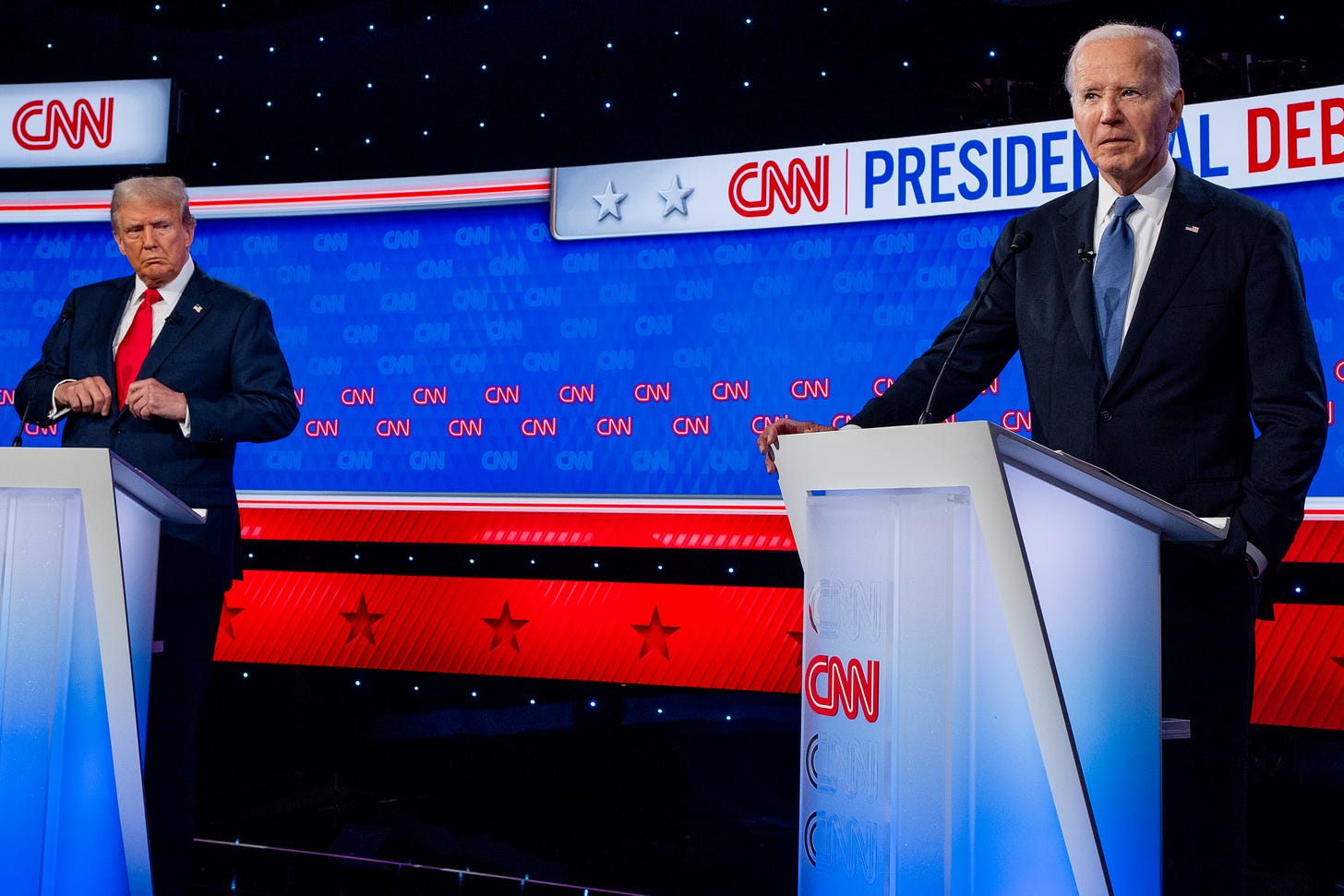Biden’s decline has been known to friends and insiders for months
Readers of this column know that President Joe Biden’s drift into blankness has been ongoing for months, as he and his foreign policy aides have been urging a ceasefire that will not happen in Gaza while continuing to supply the weapons that make a ceasefire less likely. There’s a similar paradox in Ukraine, where Biden has been financing a war that cannot be won and refusing to participate in negotiations that could end the slaughter.
The reality behind all of this, as I’ve been told for months, is that the president is simply no longer there, in terms of understanding the contradictions of the policies he and his foreign policy advisers have been carrying out. America should not have a president who does not know what he has signed off on. People in power have to be responsible for what they do, and last night showed America and the world that we have a president who clearly is not in that position today.
The real disgrace is not only Biden’s, but those of the men and women around him who have kept him more and more under wraps. He is a captive, and as he rapidly diminished over the past six months. I have been hearing for months about the increasing isolation of the president, from his one-time pals in the Senate, who find that he is unable to return their calls. Another old family friend, whose help has been sought by Biden on key issues since his days as vice president, told me of a plaintive call from the president many months ago. Biden said the White House was in chaos and he needed his friend’s help. The friend said he begged off and then told me, with a laugh: “I would rather have a root canal procedure every day than go to work there.” A long retired Senate colleague was invited by Biden to join him on a foreign trip, and the two played cards and shared a drink or two on the Air Force One flight going out. The senator was barred by Biden’s staff from joining the return flight home.
I have been told the increasing isolation of the president on foreign policy issues has been in part the doing of Tom Donilon, whose younger brother, Michael, a key pollster and adviser in Biden’s 2020 presidential campaign and in the current re-election effort, was part of the team that spent much of the week briefing Biden for last night's debate. Tom Donilon, who is 69, was President Biden's national security adviser from 2010 to 2013 and sought unsuccessfully to be named as Biden's director of the Central Intelligence Agency. He remains very much an insider.
Given Biden’s obvious decline in recent months, it is impossible for an outsider to understand why the White House agreed to any debates with Donald Trump before the election, let alone committing to the earliest presidential debate, the first of two, in modern history. One thought, I was told, was that if Biden performed well, as he had in his State of the Union speech in March, the issue of his mental capacity would be tabled. A poor performance would give the Biden campaign time to do a better prep job for the scheduled second debate.
There also was pressure from the major Democratic fundraisers, many of them in New York City, for the campaign to do something to counter the perception of the president’s obvious growing impairment, as reported and filmed by major media. I have been told that at least one foreign leader, after a closed meeting with Biden, told others that the president’s decline was so visible that it was hard to understand how, as it was put to me, “he could go through the rigors” of a re-election campaign. Such warnings were ignored.
What now? One of Washington political savants told me today that the Democratic Party is now facing “a national security crisis.” The nation is backing two devastating wars with a president who clearly is not up to it, he said, and it might be time to start drafting a resignation speech that would match or outdo the one given in March of 1968 by President Lyndon Johnson after his narrow victory over Senator Eugene McCarthy in the New Hampshire primary.
“They’re trapped,” he said of the senior advisers in the White House who hoped that Biden would somehow do well enough in last night’s debates to carry on, with the much-needed support of the more skeptical financial supporters in New York City.
Not everyone I talked to today agreed that it is time to force a Biden resignation and hope for the best at the Democratic National Convention in Chicago in August—to dump the ticket and seek new candidates. “My humble opinion,” one longtime contributor to the Democratic Party told me, “is to let the dust settle. Must examine the realistic options before some quick reaction creates an internal Democratic Party split with far-reaching consequences beyond 2024. Accept reality . . . 2024 is likely beyond recovery at this point. Too steep a hill to climb. Plan and execute a long-term plan to counter Mr. Orange and build a moderate platform for the recovery . . . and let Biden wander off to the Jersey Pine Barrens.”
A differing view was expressed by another political guru. “This is the age of social media—TikTok, Facebook, Instagram, and X—and a political campaign can go very far very fast.”
Whatever happens, we have a president—now fully unveiled—who just may not be responsible for what he does in the coming campaign, not to mention his actions in the Middle East and Ukraine.
Whatever happened to the 25th Amendment that authorizes the vice president and a majority of the Cabinet to declare the president incompetent? What is going on in the Biden White House?


No comments:
Post a Comment